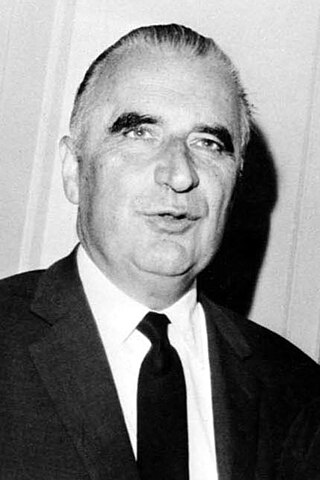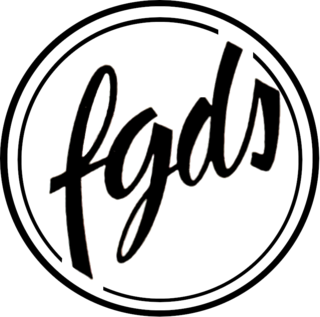
The Fifth Republic is France's current republican system of government. It was established on 4 October 1958 by Charles de Gaulle under the Constitution of the Fifth Republic.

Gaullism is a French political stance based on the thought and action of World War II French Resistance leader Charles de Gaulle, who would become the founding President of the Fifth French Republic. De Gaulle withdrew French forces from the NATO Command Structure, forced the removal of allied (US) military bases from France, as well as initiated France's own independent nuclear deterrent programme. His actions were predicated on the view that France would not be subordinate to other nations.

The Union for French Democracy was a centre-right political party in France. The UDF was founded in 1978 as an electoral alliance to support President Valéry Giscard d'Estaing in order to counterbalance the Gaullist preponderance over the French centre-right. The UDF took its name from Giscard's 1976 book, Démocratie française.

Alain Émile Louis Marie Poher was a French politician who served as President of the Senate from 1968 to 1992. Under this capacity, he was twice briefly acting President of France, in 1969 and 1974 following the resignation of Charles de Gaulle and the death of Georges Pompidou respectively. Poher was affiliated with the Popular Republican Movement (MRP) until 1966 and later with the Democratic Centre (CD) and Centre of Social Democrats (CSD), which he joined in 1976.

Presidential elections were held in France in 1974, following the death of President Georges Pompidou. They went to a second round, and were won by Valéry Giscard d'Estaing by a margin of 1.6%. It is to date the closest presidential election in French history.

Presidential elections were held in France on 1 June 1969, with a second round on 15 June. They were triggered by the resignation of President Charles de Gaulle on 28 April 1969.

Presidential elections were held in France on 5 December 1965, with a second round on 19 December. They were the first direct presidential elections in the Fifth Republic and the first since the Second Republic in 1848. It had been widely expected that incumbent president Charles de Gaulle would be re-elected, but the election was notable for the unexpectedly strong performance of his left-wing challenger François Mitterrand.

Legislative elections were held in France on 10 June and 17 June 2007 to elect the 13th National Assembly of the Fifth Republic, a few weeks after the presidential election run-off on 6 May. 7,639 candidates stood for 577 seats, including France's overseas possessions. Early first-round results projected a large majority for President Nicolas Sarkozy's Union for a Popular Movement (UMP) and its allies; however, second-round results showed a closer race and a stronger left. Nevertheless, the right retained its majority from 2002 despite losing some 40 seats to the Socialists.

The Independent Republicans were a liberal-conservative political group in France founded in 1962, which became a political party in 1966 known as the National Federation of the Independent Republicans. Its leader was Valéry Giscard d'Estaing.

Legislative elections were held in France on 12 and 19 March 1978 to elect the sixth National Assembly of the Fifth Republic. The election results were a victory for conservatives. The results were considered a surprise, as most electoral indications were that the left-wing would win the elections.

Legislative elections were held in France on 4 and 11 March 1973, to elect the fifth National Assembly of the Fifth Republic.

Early legislative elections were held in France on 23 and 30 June 1968, to elect the fourth National Assembly of the Fifth Republic. They were held in the aftermath of the a general strike in May 1968. On 30 May 1968, in a radio speech, President Charles de Gaulle, who had been out of the public eye for three days, announced the dissolution of the National Assembly and called legislative elections to restore order.

The Federation of the Democratic and Socialist Left was a conglomerate of French left-wing non-Communist forces. It was founded to support François Mitterrand's candidature at the 1965 presidential election and to counterbalance the Communist preponderance over the French left.

Legislative elections were held in France on 18 November and 25 November 1962 to elect the second National Assembly of the Fifth Republic.

Democratic Centre was a Christian-democratic and centrist political party in France. The party existed from 1966 until 1976, when it merged with Centre, Democracy and Progress (CDP) to form the Centre of Social Democrats (CDS). The party's long-time leader was Jean Lecanuet.

Legislative elections were held in France on 10 November 1946 to elect the first National Assembly of the Fourth Republic. The electoral system used was proportional representation.

Legislative elections were held in France on 17 June 1951 to elect the second National Assembly of the Fourth Republic.
The Third Force was a political alliance during the Fourth Republic (1947–1958) which gathered the French Section of the Workers' International (SFIO) party, the Democratic and Socialist Union of the Resistance (UDSR), the Radicals, the Popular Republican Movement (MRP) and other centrist politicians who were opposed to both the French Communist Party (PCF) and the Gaullist movement. The Third Force governed France from 1947 to 1951, succeeding the tripartisme alliance between the SFIO, the MRP and the PCF. The Third Force was also supported by the National Centre of Independents and Peasants (CNIP), which succeeded in having its most popular figure, Antoine Pinay, named Prime Minister in 1952, a year after the dissolving of the Third Force coalition.

The National Centre of Independents and Peasants is a right-wing agrarian political party in France, founded in 1951 by the merger of the National Centre of Independents (CNI), the heir of the French Republican conservative-liberal tradition, with the Peasant Party and the Republican Party of Liberty.

The Socialist Party is a centre-left to left-wing political party in France. It holds social democratic and pro-European views. The PS was for decades the largest party of the "French Left" and used to be one of the two major political parties under the Fifth Republic, along with the Rally for the Republic in the late 20th century, and with the Union for a Popular Movement in the early 2000s. It is currently led by First Secretary Olivier Faure. The PS is a member of the Party of European Socialists, Progressive Alliance and Socialist International.






















